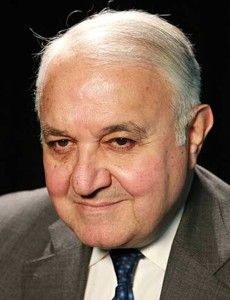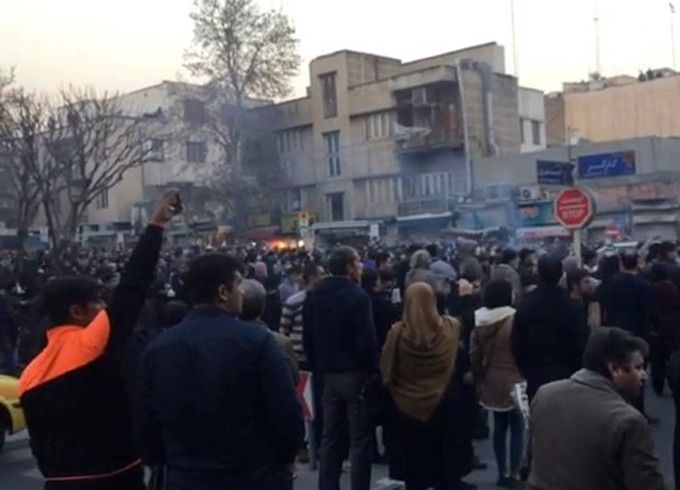By Ali Jalali
The Iranian authorities have accused a number of individuals and foreign powers of instigating the nationwide civil unrest, which started on December 28 in Mashhad, capital of northeastern Khorasan Province, and spread to other parts of the country. According to human-rights groups, more than 3,700 people were arrested during the protests, and another 25 were killed.
The police and the security forces have, however, argued that they acted in the interest of national security. The truth is that the authorities brutalized ordinary people who protested against the failed policies of the government. By accusing foreign enemies of plotting against the regime, the Islamic Republic is clearly trying to deflect criticism for mismanaging the country in the past four decades.
What role did foreign powers actually play in the protests? Is supporting popular protests tantamount to meddling in the internal affairs of a nation? Has the Islamic Republic acted in the interests of national security? Does the regime have the right to accuse the protesters of acting against the national interest?

Kayhan London recently put these and other questions to Dr. Mehrdad Khansari, a political activist and former diplomat.
How should we view the reactions by the world powers to the recent unrest in Iran? Is it possible that their support for the protesters could be deemed as meddling in Iran’s internal affairs?
It is quite normal for some countries around the world to express their support for popular protests in another country. Most governments gauge their response according to the issues that concern them in their relationship with Iran. The Europeans, for instance, support the rights of the Iranian people to hold demonstrations. And they’ve called on the Islamic Republic to recognize the civil rights of its citizens. But they weren’t confrontational in their response. The U.S., on the other hand, took a more aggressive approach towards Iran. It even asked the UN Security Council to discuss the protests in a special session.
The civil unrest in Iran clearly didn’t pose a threat to world peace and security, and that’s why the other 14 members of the UN Security Council took a different stance than the U.S. on the issue. Most of these countries were already urging Iran to show restraint in its dealing with the protesters. However, the UN special session revealed that they all hold completely different views on the matter.
Meanwhile, Saudi Arabia, Egypt, Russia and even China have condemned the violent crackdown on the protesters. But most of them have been equivocal in their criticism of Tehran, because they all have violated the human rights of their own citizens at one time or another. They don’t want to draw any attention to their dismal human rights record. Despite the great animosity between Riyadh and Tehran, the Saudi government didn’t directly criticize the Islamic Republic. Saudi state TV and media outlets launched a full frontal attack on the Iranian regime for its handling of the unrest.
Can we say that some of these countries violated diplomatic protocols by sympathizing with the protesters in Iran? Does a foreign government have the right to support protesters in another country?
Most governments, in the past, refrained from interfering in other countries’ internal affairs. The traditional view was that the domestic problems of a country were of no concern to others unless it had a direct impact outside its borders.
After World War II, the geopolitical tensions between the Eastern Bloc (namely the Soviet Union and its satellite states) and Western powers (meaning the United States and its NATO allies) led to the Cold War. The battle for democratic values and human rights transformed the world of diplomacy and foreign relations. Nowadays, it is quite acceptable for a country to support and promote democratic institutions and human rights groups in another country.
In your view, how should a foreign power express its support for popular unrest in another country without violating diplomatic protocols or being accused of plotting against that government? How should the international community respond to the outcry against oppression and injustices?
Traditions and conventions are not static states but dynamic processes. They change and evolve. What might have been a diplomatic taboo in the nineteen century, for instance, has now become an acceptable foreign policy practice.
Nowadays, the governments don’t always confront each other on every issue. They instead use mass media, news outlets and social networks to communicate directly with people in other countries. We live in a global village where governments can speak directly to people around the world.
There are also international organizations that monitor events around the world, such as the United Nations Commission on Human Rights (OHCHR), which reports on human-rights violations in various countries. Unfortunately, many of these human rights bodies, including the Third Committee of the General Assembly [focused on social, humanitarian and cultural issues] can only collect data. Only the UN Security Council has the power to pass resolutions against countries which violate the human rights of their citizens.
What concerns Tehran is not so much the media propaganda, but the alleged plots by the U.S. and Saudi Arabia to topple the Islamic Republic. Supreme Leader Ayatollah Ali Khamenei believes that these foreign enemies have founded and financed espionage cells inside Iran for the sole purpose of instigating unrest and undermining the regime. This is a ludicrous idea of course. There is no evidence that a foreign power was behind the recent unrest in Iran.
What makes the American approach to Iran different from that of European countries? Is Washington’s message reaching the Iranian people? Can the U.S. successfully clarify its position on some of these issues to the Iranian public?
Yes. I think the U.S. can be a powerful force against the Islamic Republic’s global ambitions. For instance, Washington recently imposed sanctions against 14 Iranian individuals and entities, including Sadeq Larijani, the head of the Judiciary. This clearly shows that the most powerful country in the world, namely the U.S., and its allies are siding with the Iranian people and moderate forces inside the country in opposing extremist elements within the Islamic Republic regime. U.S. foreign policy could undoubtedly be a positive driving force. European governments have been rather cautious by comparison. They have a different set of problems with Iran. They are not as eager as the U.S. to lock horns with the Islamic Republic.
Do you accept the regime’s definition of the “national interest,” which in effect means that people should ignore foreign powers? Or do you believe that Iranians know which country they should listen to? How do you interpret national interest?
The Islamic Republic believes that foreign powers use the media to incite unrest inside the country with the ultimate goal of changing the regime. In their viewpoint, this is against the national interest. But we are facing popular unrest. A large segment of Iranian society and many senior government officials are acutely aware that the political, social and economic situation in the country would not improve without fundamental changes in the governing system. So people won’t be acting against the national interest if they express their discontent and advocate change. This is a far cry from a deliberate attempt by a foreign power to fund separatist forces for the sole purpose of destabilizing the political and social fabric of a country.
A number of senior Saudi officials have said openly that they would support anti-regime elements inside Iran. This is completely different from the support the international community has given to the ordinary people who took to the streets in cities around the country to protest the government’s failure to create jobs, eradicate poverty, raise the standard of living, and tackle unemployment. We shouldn’t confuse these actions.
Do you think that the recent protests will have any impact on the U.S.’s decision to withdraw from the JCPOA [Joint Comprehensive Plan of Action, or Iran nuclear deal?]
I don’t think the recent unrest will have any impact on the nuclear deal, particularly since Foreign Minister Javad Zarif has been holding talks with many of his European counterparts on the issue. The international community is in full support of the JCPOA. President Trump has threatened to withdraw from the nuclear deal many times, but the U.S. has so far accepted the decision by his European partners and the findings of the IAEA inspectors. Russia, China, and the European countries will not side with the U.S. if it decides to pull out of the agreement.
I must warn that the support for the JCPOA may weaken among the Europeans if hardliners in Iran were to succeed in removing the current [reformist] government and consolidate their power. If that happens, the Europeans may side with Trump on the issue.
European countries and Great Britain have criticized U.S. actions in the UN Security Council. Many countries in the Security Council, including the UK and France, have voted against the U.S. But the situation could quickly change if the hardliners were to take control of the government in Iran.



Gentlemen! A great discussion but it must be so difficult to understand and explain, what the hell is going on within Iranian regime. You have spoken about the NATIONAL INTEREST! We don’t have it,it,s Khamenei’s interest. Iran does not have a foreign policy, the main factors that shape a country’s foreign policy is none existed in Iran. You can’t have a relation ship ,dialogue and interaction with the rest of the world, when your DOCTRIN , your grand theory is spread of terrorism,violating the citizen,s human rights, slaughtering them and imprison thousands innocents. This is not a GOVERNMENT but simply a savage, roaming tribe, had high jacked an unnecessary Revolution.Must be hard, very hard ,talking about this out law ,so called government.Kudos